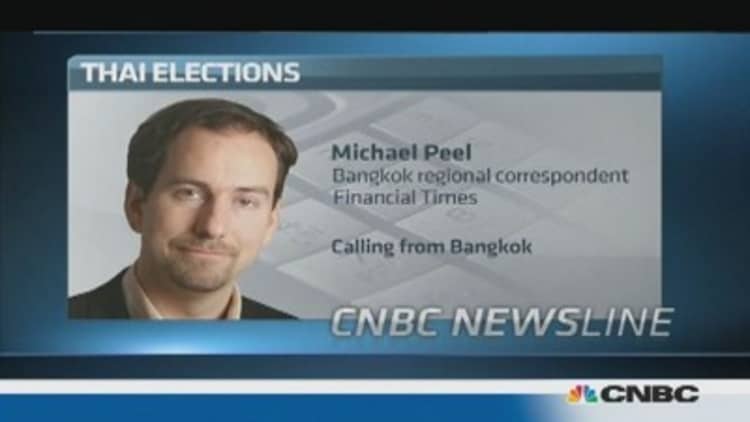
The results of Thailand's weekend elections are widely believed to be irrelevant at best, so why are its shares bucking the regional selloff with a solid rally?
The Land of Smiles was clearly looking on the bright side, with Thailand's SET index up 1.4 percent, even as most regional markets are selling off. The baht tacked on around 10 pips against the U.S. dollar. The dollar was fetching around 32.91 baht, off a low of around 32.80, compared with around 33.02 on Friday.
(Read more: Thai rice subsidies: damned if you do, and don't)

"The election went smoothly, with no violence," said Mayuree Chowvikran, a strategist at Maybank-Kim Eng in Thailand. "That's why the market reacted in a positive way," she told CNBC, noting the SET index shed around 3 percent last week.
Others believe the market may have fallen far enough for now.
"A lot of the long-term headwinds are still there, but it's come off so far that anything that suggests any kind of positive news, any kind of resolution even temporary, I think we're going to see a bounce in the market," Paul Gambles, managing director at MBMG International, told CNBC. "So for traders, rather than long-term investors, it's decent time to start having a nibble."
(Read more: Thai market may muddle through state of emergency)
While the election, held Sunday, is widely expected to return Prime Minister Yingluck Shinawatra and her party to power by solid margins, it's also generally viewed as inconclusive, with the main opposition party boycotting polls.
Anti-government protestors blocked voters in around 20 percent of districts, but even had those districts been able to field voters, not enough candidates would have been elected to make a quorum for parliament to meet; many candidates were prevented from registering to run.
(Read more: Have the protests hobbled the Bank of Thailand?)
Sunday's relatively peaceful election followed clashes Saturday in north Bangkok between supporters and opponents of the government, with at least seven wounded, Reuters reported.
Some of the pre-election tensions petered out "because people realized the election wasn't going to count for anything," Gambles said. "There's an expectation that there's going to be some way the election gets nullified: the turnout wasn't high enough, there weren't enough constituencies open. There'll be a legal challenge as to whether you can have by-elections," he added. "It really became a bit of a damp squib."
Mayuree also cited concerns about the next step for Thailand's embattled democracy, with the caretaker government and the Election Commission under the gun to hold the next election.
She noted parliament must open its first session within 30 days of the election, or by March 2, with at least 475 members, while so far, it appears only about 220 members are ready to take office.
"It's quite complicated," she said. "I'm not sure they can do it within 30 days from now."
(Read more: Has Thailand's government survived the gauntlet?)
Legal challenges are expected to start pouring in.
Government supporters say the court system typically favors the opposition in its rulings, Michael Peel, the Financial Times' regional correspondent in Bangkok, told CNBC.
"It has overturned prime ministers who were aligned with the current ruling party in the past," he noted. "The fear is this is going to be an endlessly repeating cycle, where you have an opposition that can get rid of governments, but it can't consolidate its power because it can't command the support of a majority of Thais."
(Read more: We don't mind if we lose 'fair elections': Abhisit)
In the meantime, the anti-government protestors resumed their marches in downtown Bangkok Monday, although Reuters reported that camps at two of seven big intersections blockaded since mid-January were closed, and a third may soon shut down.
While protest leaders said it was done for safety reasons, it may be due to dwindling numbers at rallies, Reuters reported.
The street protests, which began in late October, were triggered by parliament's consideration of a government-backed amnesty bill that could have allowed former Prime Minister Thaksin Shinawatra, ousted in a 2006 coup d'etat, to return home without facing prison time for a 2008 graft sentence.
While that bill was dropped, the protests have broadened to an explicit call for Yingluck, who is Thaksin's sister, to step down and demands for an unelected "people's council" to replace the democracy for an undefined period. In early December, Yingluck called a snap election in an unsuccessful effort to defuse protests.
—By CNBC.Com's Leslie Shaffer; Follow her on Twitter @LeslieShaffer1

